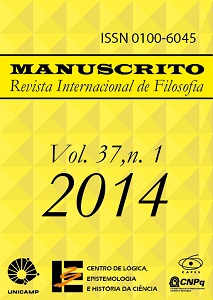Resumo
En este artículo, daré una solución a la paradoja de Fitch que se basa en el quiebre de la clausura epistémica. Mi enfoque será semántico, en la línea de Beall (2009). A diferencia de la propuesta de éste, mi sistema es lógicamente clásico, y relativamente conservador respecto a las afirmaciones sobre el conocimiento; todas sus desviaciones se basarán en la introducción de afirmaciones modales. Para dar lugar a ello, introduciré mundos posibles anormales (en esto, me acerco a Beall), pero además, mundos abiertos de dos tipos distintos que funcionarán como explicación de las desviaciones epistémicas de los agentes.
Referências
BEALL, JC. Knowability and possible epistemic oddities, en Salerno (ed.), (2009).
DRETSKE, F. “Epistemic operators”, Journal of Philosophy 67: pp. 1007-1023, 1970. . “Is knowledge closed under known entailment?”, en M. Steup y E. Sosa (eds.), Contemporary Debates in Epistemology, Blackwell, (2005).
DUMMETT, M. Fitch’s paradox of knowability, en Salerno (ed.), (2009).
EDGINGTON, D. The Paradox of Knowability, Mind 94: pp. 557-68, 1985.
FIRTH, R. “Are Epistemic Concepts Reducible to Ethical Concepts?” en Goldman y Kim (eds.) Values and Morals, Dordrecht: D. Reidel Publishing Co., (1978).
GOLDMAN, A. I. & KIM, I. Values and Morals, Dordrecht: D. Reidel Publishing Co., 1978.
HAWTHORNE, J. “The case for closure”, en M. Steup y E. Sosa (eds.), Contemporary Debates in Epistemology, Blackwell, (2005).
JENKINS, C. The Mystery of the disappearing diamond, en Salerno (ed.), (2009).
KVANVIG, J. Restriction strategies for Knowability: some lessons in false hope, en Salerno (ed.), (2009). “Closure Principles”, Philosophy Compass 1(3): pp. 256-267, 2006.
PRIEST, G. Towards non-being, OUP, 2006. Beyond the limits of Knowledge, en Salerno (ed.), (2009). An introduction to non-classical logic, Oxford University Press, 2006.RESTALL, G. Not every truth can be known (at least, not all at once), en Salerno (ed.), (2009).
SALERNO, J Introduction, en Salerno (ed.), (2009). (ed.) New essays on the Knowability Paradox, Oxford University Press, 2009. Knowability and possible epistemic oddities, Oxford University Press, 2009. Fitchs paradox of Knowability, Oxford University Press, 2009. The Mystery of the disappearing diamond, Oxford University Press, 2009. Restriction strategies for Knowability, Oxford University Press, 2009. Beyond the limits of Knowledge, Oxford University Press, 2009. Not every truth can be known, Oxford University Press, 2009. Tennants Troubles, Oxford University Press, 2009.
SOSA, E. Knowledge in perspective, Cambridge University Press, 1991.
STALNAKER, R. Inquiry, MIT Press, 1984.
STEUP M. & SOSA E. Contemporary Debates in Epistemology, Blackwell, 2005.
TENNANT, N The taming of the true, Oxford University Press, 1997.
TURRI, J. “On the relationship between doxastic and propositional justification”, Philosophy and Phenomenological Research, 80(2): pp. 312-326, 2010.
WILLIAMSON, T. Tennant’s Troubles, en Salerno (ed.), (2009). Knowledge and its limits, Oxford University Press, 2000.
WRIGHT, C. “Strict Finitism”, Synthese 51 (2): pp. 203 - 282, 1982.

